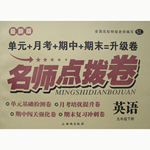题目内容
--- I bought this MP4 for only 300 yuan.
--- You really got a wonderful _______.
- A.price
- B.value
- C.bargain
- D.gift
试题分析:名词辨析。A价格;B价值;C便宜货;D礼物,天赋;句意:—我只花了300元就买了这个Mp4。—你真是买到了一个便宜货啊!根据句意说明C正确。
考点:考查名词词义辨析
点评:名词的词义辨析要放在上下文的语境中进行,要注意上下文的语义的串联以及逻辑关系的推理,特别要注意一些名词的固定搭配以及名词的深层次的含义的区别。

 名师点拨卷系列答案
名师点拨卷系列答案One day while shopping in a small town in southern California,it was my misfortune to be approached by a clerk whose personality conflicted with mine. He seemed most unfriendly and not at all concerned about my intended purchase. I bought nothing,and marched angrily out of the store. My hostility(敌意) toward that clerk increased with each step.
On the outside,standing by the road,was a darkskinned young man in his early twenties. His expressive brown eyes met and held mine,and in the next instant a beautiful, dazzling smile covered his face. I gave way immediately. The magnetic(磁力的) power of that smile dissolved all bitterness within me,and I found the muscles in my own face happily responding(回应).
“Beautiful day,isn't it?”I remarked,in passing. Then,I turned back.“I really owe you a debt of gratitude,”I said softly.
His smile deepened, but he made no attempt to answer.A Mexican woman and two men were standing nearby.The woman stepped forward and volunteered, "Sir, but he doesn't speak English.Do you want me to tell him something?" In that moment I felt transformed(改变).The young man's smile had made a big person of me.My friendliness and good will toward all mankind stood ten feet tall.
"Thank you?" The woman seemed slightly puzzled.
I gave her arm a friendly pat as I turned to leave."Just tell him that," I insisted."He'll understand.I am sure !"
Oh, what a smile can do! Although I have never seen that young man again, I shall never forget the lesson he taught me that morning.From that day on, I became smile-conscious, and I practice the art anywhere and everywhere, with everybody.
1.Why did the author leave the store angrily?
|
A.The clerk treated him unkindly. |
B.He couldn't buy what he wanted. |
|
C.The clerk didn't speak English. |
D.The store's goods were too dear. |
2.By saying "I felt the muscles(肌肉) in my own face happily responding" (in Paragraph 2), the author means __.
|
A.he was still angry |
B.he did not want to smile |
|
C.he would thank the young man |
D.he smiled back at the young man |
3.The author asked the woman to say "Thank you!" to the young man because the young man_____.
|
A.had helped the author before |
B.taught the author how to smile |
|
C.was a kind employee of the store |
D.taught the author a valuable lesson |
4.In the passage, the author seems to suggest that we should __ ___.
|
A.be generous to strangers |
B.practice smiling every day |
|
C.smile at other people |
D.help people in trouble |
After watching the movie Inception《盗梦空间》, I bought some DVD copies of the film, but now is left.
|
A.none |
B.nothing |
C.no one |
D.neither |